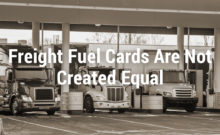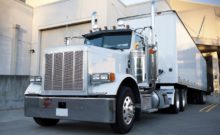In the trucking industry, loans and other types of financing are readily available for those seeking extra working capital. As we drill down into the details, many lenders advertise the advantages recourse financing over nonrecourse financing, but is it really all it is cracked up to be?
Recourse Financing
Recourse financing is associated with bank loans and similar debt structures. Recourse financing holds drivers and fleet owners liable for the balance owed on loans. As insurance against defaulting on loans, recourse financing frequently requires borrowers to put up some form of collateral. Collateral can be property, trucks, credit cards, and other fixed assets. If a fleet owner or independent driver misses a payment on the loan, or defaults in some way, the collateral is confiscated by the bank. It should be noted that even after collateral is confiscated, banks and similar lending institutions will still collect the amount owed on the loan. Defaulting on recourse financing severely impacts credit ratings, and often results in fleets and owner operators going out of business.
Nonrecourse Financing
Nonrecourse financing offers more flexibility to the trucking industry. While collateral is still used to secure financing, there are no hefty penalties if the borrower defaults on the loan. Lenders still have the ability to take the property used as collateral, but they cannot pursue payments beyond that point. Even if the collateral used to secure nonrecourse financing is less than the total amount of the loan, lenders cannot attempt to get more payments from borrowers.
Nonrecourse Financing For Truckers
Freight load factoring is a form of nonrecourse financing designed specifically for the trucking industry. Instead of using traditional loans for working capital, or waiting on payments from customers, freight load factoring converts open invoices to revenue within 24 hours. What sets freight load factoring apart from other forms of nonrecourse financing is that the invoices themselves are used as collateral. Based on the creditworthiness of the customers involved, freight load factoring converts invoices to working capital, and then the fleet or driver relinquishes responsibility of getting payment from their customers. Regardless of if the customer ends up paying, fleets and truck drivers end up getting working capital for the submitted invoices.
Learn More About Nonrecourse Solutions
At Express Freight Finance, we specialize in non-recourse working capital solutions for the trucking industry. Our freight load factoring program ensures fleet owners and independent drivers maintain a steady cash flow, and we offer tools to check the creditworthiness of your customers and much more. Contact our offices today.






